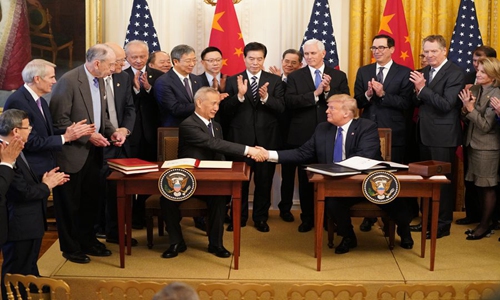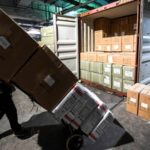A vast majority of Chinese analysts believe China should invoke a disaster-related clause in the phase one trade agreement and begin discussions about the impact of the coronavirus outbreak on increasing imports from the US, a survey conducted by the Global Times showed on Monday.
The survey of 20 trade experts, including former trade officials and advisors to the Chinese government, revealed different projections of how exactly NCP will affect China’s imports from the US in the first quarter, with some predicting a decline of as much as 25 percent and others arguing imports from the US could even increase in the quarter.
Among the surveyed, 12 said China should launch consultations with the US to find a resolution for potential impact from the outbreak on China’s ability to increase its purchases of US agricultural, manufacturing and other products as agreed upon in the phase one agreement.
Under the deal inked last month, China has agreed to increase its purchases of US products worth of $200 billion over the next two years. The agreement also included a clause allowing consultation between the two parties “in the event that a natural disaster or other unforeseeable event outside the control of the parties delays a party from timely complying with its obligations.”
“The NCP we have encountered constitutes a ‘natural disaster’ or an ‘event outside the control of the parties,’ so invoking the clause and conducting negotiations again is, I think, not only completely possible but should definitely be pursued,” said Sheng Songcheng, a former senior official with the People’s Bank of China, the country’s central bank.
Chinese experts close to the government told the Global Times last week that China was considering launching discussions with US officials. But Larry Kudlow, director of the US National Economic Council, said they were consulting with officials from both sides, though there was “nothing formal.”
However, some analysts argue there is still no need to launch negotiations as the coronavirus outbreak will not affect China’s willingness nor its ability to fulfill the phase one agreement.
“The epidemic will not result in a sharp drop in imports from the US, so it is unnecessary to launch the unforeseeable event clause,” said Wang Xiaosong, an economics professor at the Renmin University of China in Beijing.
Wang argued that imports from the US could increase rather than decline as the epidemic has constrained China’s supply of necessities and increased demand for foreign imports. “Imports [from the US] could increase slightly. At least, they will not decline significantly,” he said.
US soybean farmers could even see record exports to China this year. Recovery in demand after the epidemic is contained will offset the decline in the first quarter, which is usually a slow season, said Zhang Xiaoping, country director for China at the US Soybean Export Council.
“This year, China’s purchases of US soybeans could reach or even exceed the record 36 million tons during the 2016-17 season, but much of the purchase will take place in the second half of the year,” Zhang told the Global Times on Sunday.
However, many experts surveyed predicted a double-digit decline in China’s imports of US products and services due to the coronavirus epidemic. The decline rate could be as high as 20 percent or more in the first quarter, according to some experts.
“China’s all-out efforts to prevent and contain the epidemic could have a relatively huge impact on the economy, trade and investment activities. Under such circumstances, China-US trade will see a relatively large impact,” said Sang Baichuan, director of the Institute of International Business at the University of International Business and Economics in Beijing.
Chinese officials did not release data for trade in January last week as previously planned, noting that the data will be published next month along with the data for February.
US President Donald Trump and Chinese Vice Premier Liu He, who is also a member of the Political Bureau of the Communist Party of China Central Committee and chief of the Chinese side of the China-U.S. comprehensive economic dialogue, shake hands after signing the China-U.S. phase-one economic and trade agreement during a ceremony at the East Room of the White House in Washington D.C., the United States, Jan. 15, 2020. (Xinhua/Wang Ying)



